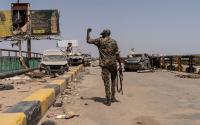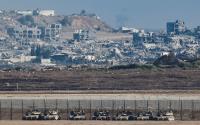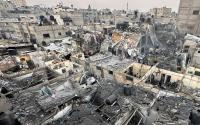Common Dreams / Published on Thursday, February 8, 2007 by McClatchy NewspapersWarren P. Strobel
One out of every seven Iraqis has fled his or her home or sought refuge abroad, the largest movement of people in the Middle East since the war that followed Israel's creation in 1948, according to United Nations officials and relief workers. Every day, violence displaces an estimated 1,300 more Iraqis in the country; every month, at least 40,000.
 |
Against that backdrop, the Bush administration is moving - belatedly, in the view of critics - to address a problem that it's widely seen as having created by invading Iraq in March 2003.
On Monday, Secretary of State Condoleezza Rice announced the creation of a high-level State Department task force on the refugee issue. State Department officials said the Bush administration will expand the number of refugees it allows into the U.S., with special attention given to Iraqis who may be at risk because they worked for the U.S. government. But the administration would admit only 20,000 Iraqis at most this year.
In his just-released budget, President Bush asked for $35 million to help Iraq's refugees in fiscal year 2008, plus $15 million in supplemental funding for this year.
The U.S. Committee for Refugees and Immigrants, a private nonprofit group, had urged Bush to seek $250 million as part of a supplemental war funding request.
The Bush administration "has been slow to react to a worsening situation, amid ample warnings," Sen. Patrick Leahy, D-Vt., said in a statement. Rice's task force, he said, "is a hopeful sign, and it can move us forward as long as it doesn't waste time pondering the obvious."
The U.N. High Commissioner for Refugees estimated in a report last month that there are as many as 2 million Iraqi refugees in neighboring countries, primarily in Syria and Jordan. Another 1.7 million people are displaced within Iraq, the UNHCR said.
Some of the refugees fled during Iraqi President Saddam Hussein's reign, before the U.S. invasion. But the exodus has accelerated since the bombing of a Shiite Muslim mosque in the city of Samarra last February.
Non-governmental groups working with refugees say that outside aid can't come fast enough, because Syria and Jordan are hinting at closing their doors. Other neighbors, such as Saudi Arabia, have accepted almost no refugees. The Saudis are building a barrier along the border with Iraq,
"In six months, it will be too late," said Kristele Younes of Refugees International, an advocacy group. "We're not seeing the U.S. do much, frankly."
Senior U.S. officials sidestepped the question of whether Washington bears special responsibility for Iraqis fleeing the violence.
"It's a shared global responsibility," State Department spokesman Sean McCormack told reporters.
Randall Tobias, the administrator of the U.S. Agency for International Development, said the emphasis will remain on helping refugees in the region.
"Obviously what we're trying to do is to create circumstances to reduce the numbers of refugees who want to come to the United States or elsewhere," Tobias said.
Assistant Secretary of State Ellen Sauerbrey told a Senate hearing last month that the United States had admitted 466 Iraqi refugees since 2003. She ascribed the small number to the Department of Homeland Security's stringent security review of each applicant. She said that number could expand to as many as 20,000 this year.
The U.S. Committee for Refugees said Wednesday that it welcomed Rice's initiative and urged the administration to expedite resettlement of Iraqis who worked for the U.S. or allied militaries.
But even if the United States and other countries open their doors wider, only a small fraction of Iraq's legions of refugees would be resettled abroad.
The Geneva-based UNHCR last month asked for $60 million from foreign donors to protect and aid the refugees. Of that amount, $40 million has been pledged, and $9.1 million received, said agency official Tim Irwin.
The UNHCR acknowledged that even if the appeal is fully subscribed, it would help only a fraction of displaced Iraqi families.
It's "a drop in the bucket," Younes said.
The crisis is likely to get worse before it gets better. UNHCR projects that the number of internally displaced in Iraq could grow to about 2.7 million by year's end.
A recent report by the Washington-based Brookings Institution said that if Iraq spirals into all-out civil war, U.S. troops might have to establish "catch basins" along Iraq's borders to care for tens or hundreds of thousands of Iraqis fleeing the violence.






